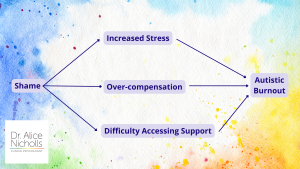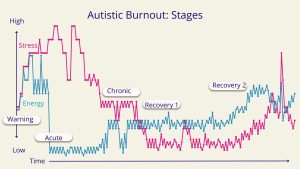What Causes Autistic Burnout?
Autistic Burnout is a big issue for many autistic people. At the time of writing there were 3.9k uses of the hashtag #autisticburnout on instagram alone.
I’ve covered ‘What is Autistic Burnout?’ And ‘Am I in Autistic burnout?’ in previous blog posts. So this post will focus on the causes of autistic burnout.
So what causes autistic burnout?
For such a complex and disabling problem, the causes are disappointingly simple.
Basically, Autistic burnout is caused by:
Too Much Stress and Not Enough Help
So let’s break that down a bit more:
Too Much Stress
Stress is a massive issue for many autistic people. We know that stress causes burn outs and puts us at greater risk of meltdowns and shutdowns… and that’s before we even start to think about the impact of stress on our long term health.
But what exactly causes stress in autistic adults?
Here are just few of the causes of stress for autistic people:
- Masking
- The Double Empathy Problem
- Sensory Sensitivities and Unmet Sensory Needs
- Executive Functioning Difficulties
- Coping with Change
- Life Events
- Daily Hassles
Masking
Social pressures and demands that might be unnoticable to a neurotypical person can create a daily stressor for an Autistic person. This is particularly true if you are trying to pass as neurotypical at home, work or socially.
Masking is a technique used by many autistic people to try and appear neurotypical. The autistic person learns the social rules of engagement by being told they’ve got it wrong or observing other people in real life or on film.
The Autistic person learns how and when to make eye contact, they might develop scripts in their head for conversations and remember rules for when to talk and how much. This means the autistic person may look like they are performing well socially when in fact they are working very hard, just to appear ‘normal’.
While Masking may serve to help protect the autistic person in some scenarios it can come at a significant cost. The autistic person is having to analyse every situation and think about how they are meant to respond with their face, eyes, body, words, tone and pace. This is simply not sustainable for long periods of time and can cause stress levels to increase.
Sensory Sensitivities and Unmet Sensory Needs
It is common for Autistic people to be hyper (over) or hypo (under) sensitive to the following sensory input:
- Visual (sight)
- Olfactory (smell)
- Auditory (hearing)
- Tactile (touch)
- Gustatory (taste)
- Propriocepive (feedback about how your body feels and where it is)
- Vestibular (movement and balance)
- Interception (what is happening inside your body)
This can mean that a sound, sight, smell or sensation that other people don’t even notice can cause a significant amount of stress to an autistic person.
For example the noise a phone charger makes may cause a rise in stress levels.
Perhaps surprisingly some people, with under-responsive sensory systems require a high level of sensory stimulation to feel adequately stimulated and without this stimulation they may feel stressed. For example they might need to rock, chew or hum. If they are unable to engage in these ‘stimming’ behaviours they may feel more stressed.
Difficulties with interception can mean that you don’t notice you are hungry, thirsty or in pain. Instead you might feel a general sense of discomfort which further increases your stress levels.
Autistic people may also deny themselves their sensory needs in order to fit in or ‘mask’. For example suppressing stimulation seeking behaviour (stimming) or trying to maintain their presence in environments that are overwhelming their sensory systems.
In these scenarios an autistic person who has made a significant effort to ‘pass’ as neurotypical can be exposed to chronically high levels of stress for years while appearing to function at an unremarkable level.
Executive Functioning Difficulties
Executive functioning skills are planning, organising and problem solving skills. These do not come easily to autistic people, who can become overwhelmed by having too much to do, uncertainty and chaos. We are likely to find having extra things to do, stressful life events and minor hassles more difficult that neurotypical people might assume.
We tend to compensate for these difficulties by developing routines and rules, so that, rather than having to plan and organise every time, we can apply an existing rule or routine to multiple events. For example, structuring the routine around getting dressed, getting bags packed, eating breakfast and getting ready to leave the house. These pre existing routines and rules make our day to day life easier. However, we find it difficult to adapt if we get interrupted or if things change during the day. Losing just one step in our usual routine can make it difficult to continue and cause stress.
Coping with Change
Because of our executive functioning difficulties, we like things to be predictable and to find rules and routines that work. We can find it difficult to imagine what a change will look like and all of the things we might need to consider to manage this change. As a result, changes can cause high levels of stress. Working out what to expect and adapting our routines requires us to have the time and mental capacity for planning, this makes change stressful at best and unmanageable at worst.
Life Events
Life events happen for autistic people just as much as they do for neurotypical people, our relatives get ill, they need support, they die. Some of us have weddings, children, exams, job interviews. All of these standard sources of stress still apply to autistic people and we are likely to find them even more difficult due to problems with executive functioning, coping with change and the perceived requirements to mask during some of these life events.
Daily Hassles
Daily hassles are sources of stress that are not life changing but have a cumulative effect. For example, missing your bus, running out of your favorite breakfast cereal or the boiler breaking down. These things raise people’s stress levels regardless of their neurotype, but for autistic people they are likely to have even greater impact. For example the sensory issues associated with missing a shower, both the loss of the sensory input of the shower (tactile, auditory and proprioceptive) and the consequences of not showering such as the feeling of slightly sweaty skin and increased body odour. Whereas a neurotypical person might not particularly mind running out of breakfast cereal and instead have some toast or pick up something on the way to work, this requires some flexibility of thought. An autistic person is likely to find it difficult to find an alternative and more likely to feel unhappy about it.
Too much to do and too little time
You may be at a life stage where you are expected to do a lot of things at once, you might be studying, trying to maintain friendships or relationships and doing household chores or you might be working, looking after family members and trying to find time for your hobbies. If you feel like you don’t have enough hours in the day and like you don’t have time to relax then it is likely you have too much to do.
While having too much to do is an incredibly common problem, it doesn’t mean it’s okay. If you are feeling drained by how much you have to do then this is likely to be contributing to your feeling burnt out.
Not Enough Help
For every stressor, there is potentially a source of support that would reduce the impact of the stressor.
Not Enough Understanding From Others
If the people around you do not understand autism or have a narrow definition of what is acceptable social behaviour you may find you feel the need to mask. You might feel you need to work extra hard in social interactions and feel unable to ask for adaptations such as a bit of extra thinking time or to talk about something later. You may also feel unable to stim or block out unpleasant stimuli by wearing ear defenders or sunglasses. If you are spending a lot of time around these people or in environments where you are expected to look neurotypical this is particularly hard.
Not Enough Support with Sensory Needs
You may be aware of your sensitivities to certain sensory input but not always know what to do about them. You may need adaptations made to your home or workplace to make them easier to be in on a sensory level. You may also have unmet sensory needs that you are unaware of and need further assessment. And you may be aware of your stimming needs but find it hard to find the time and space to engage in them.
Not Enough Emotional and Practical Support
Stressful life events are easier to manage if you’ve got people around you who understand you and can help you through times of severe grief and stress. You might want to talk things through, to seek physical comfort or to have practical support with household tasks and basic activities of daily life. Having people you trust and who care about you in your life can be really helpful but not everyone has access to this. Some people find that they want support but the way their friends or family try to provide it feels overwhelming or demanding. Some people find it hard to ask for help in the first place for fear of being told ‘it’s not a big deal’ or that the other people are too busy. Sometimes people offer support that feels too socially demanding ‘e.g. I’ll come round and we can talk it through’ when you don’t feel ready to see anyone and just want a text conversation.
Gaslighting/ Denial
As a person who is more likely to be traumatised by life events and to have intense sensory experiences you have probably, at some point in your life, been told that you are wrong about the way you feel.
You may have cried over a small scratch, claimed you were scalded by warm water, put your fingers in your ears while someone ate an apple or complained at the noise of a strip light. You may have fallen into a deep depression after the death of a beloved pet or at the end of your favorite television series.
It is highly likely that at some point someone has told you ‘it’s not that bad’ ‘don’t be silly’, ‘you’re not hurt’, ‘it’s not hot’, ‘you’re not hungry’, ‘you’re not cold’, ‘you can’t be depressed’. This may well have been by a well meaning parent, friend or colleague, however these statements undermined your ability to trust your bodily and emotional signals. You might find it hard to know how you are feeling or what would make you feel better. You may be scared to tell people how you are feeling for fear they will deny your experience or accuse you of overreacting.
Shame
Unsurprisingly, the lived experience of finding life much harder than our neurotypical peers can lead to a real sense of ‘not being good enough’. Autistic people often come to therapy with me describing an absolute disgust with themselves for not coping better and not ‘just getting on with it’. This is a barrier to their seeking help and can mean that people’s mental health deteriorates for a long time before they seek help.
Summary
Autistic Burnout is caused by too much stress and not enough help. Autistic people are more likely to experience stress for many reasons. We experience sensory and social challenges that are not always understood or adapted for. We struggle with change and uncertainty and have often experienced negative reactions to our complaints and requests for help. This makes it difficult to ask for help when things get hard. Often we mask so much we pass as unremarkable neurotypicals despite our putting in a remarkable level of effort. This extreme level of effort is simply unsustainable and leads to eventual exhaustion and burnout.
If you think you might be experiencing autistic burnout you may find my Autistic Burnout Symptom Checklist helpful, please click here to download it.
I am an Autistic Clinical Psychologist specialising in Autistic Burnout if you would like to know more about my work please check out my:
- Mailing list community for people who want to receive helpful information and resources about Autistic Burnout.
- Free short course on How to Break the Cycle of Autistic Burnout (link goes straight to registration page)
- Authenticity Basecamp: A 90 day support programme for people in the early stages of recovering from Autistic Burnout who want to get calmer, clearer and more supported.
- Authenticity: The Course and Community: For late-realised, high-masking Autistic adults who want to build more sustainable, authentic lives and break free of the cycle of Autistic Burnout for good.











